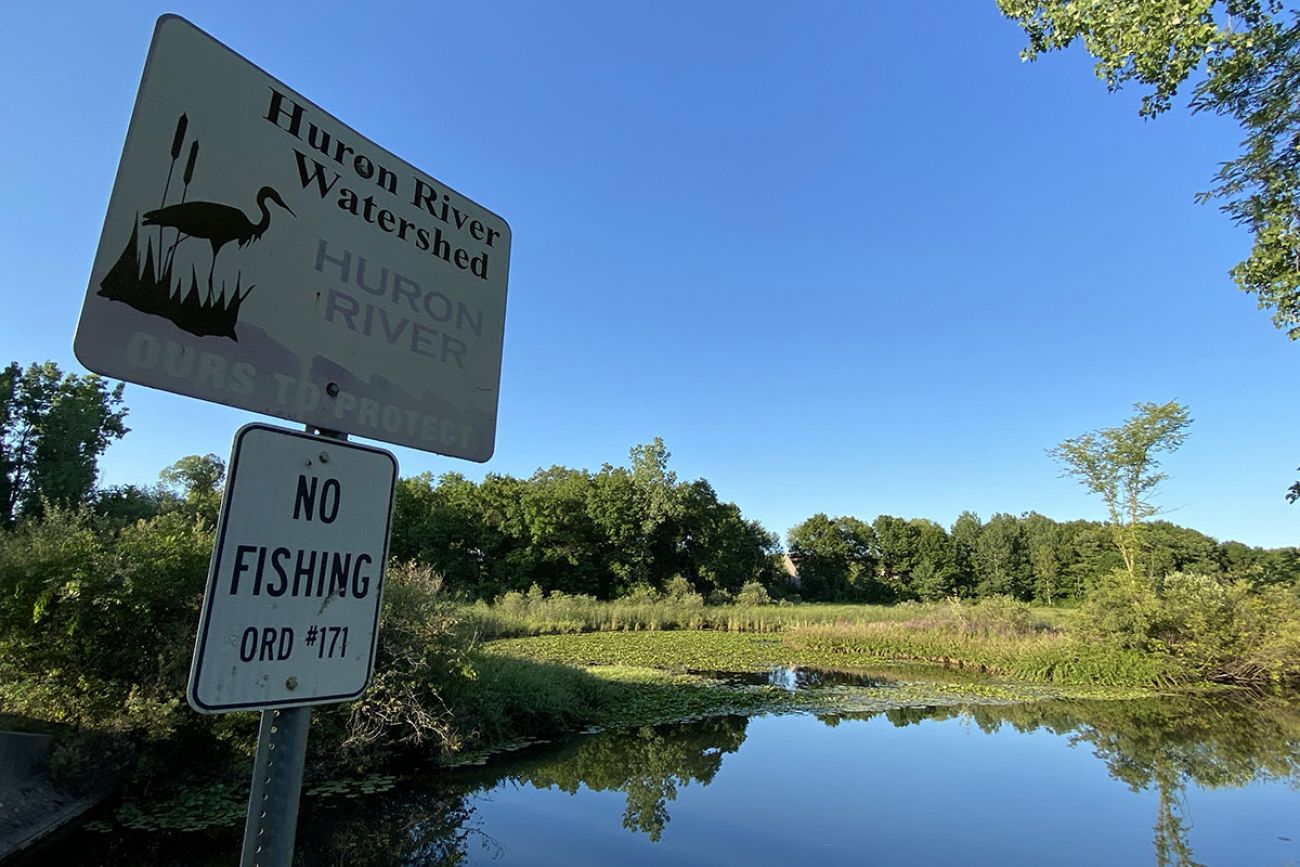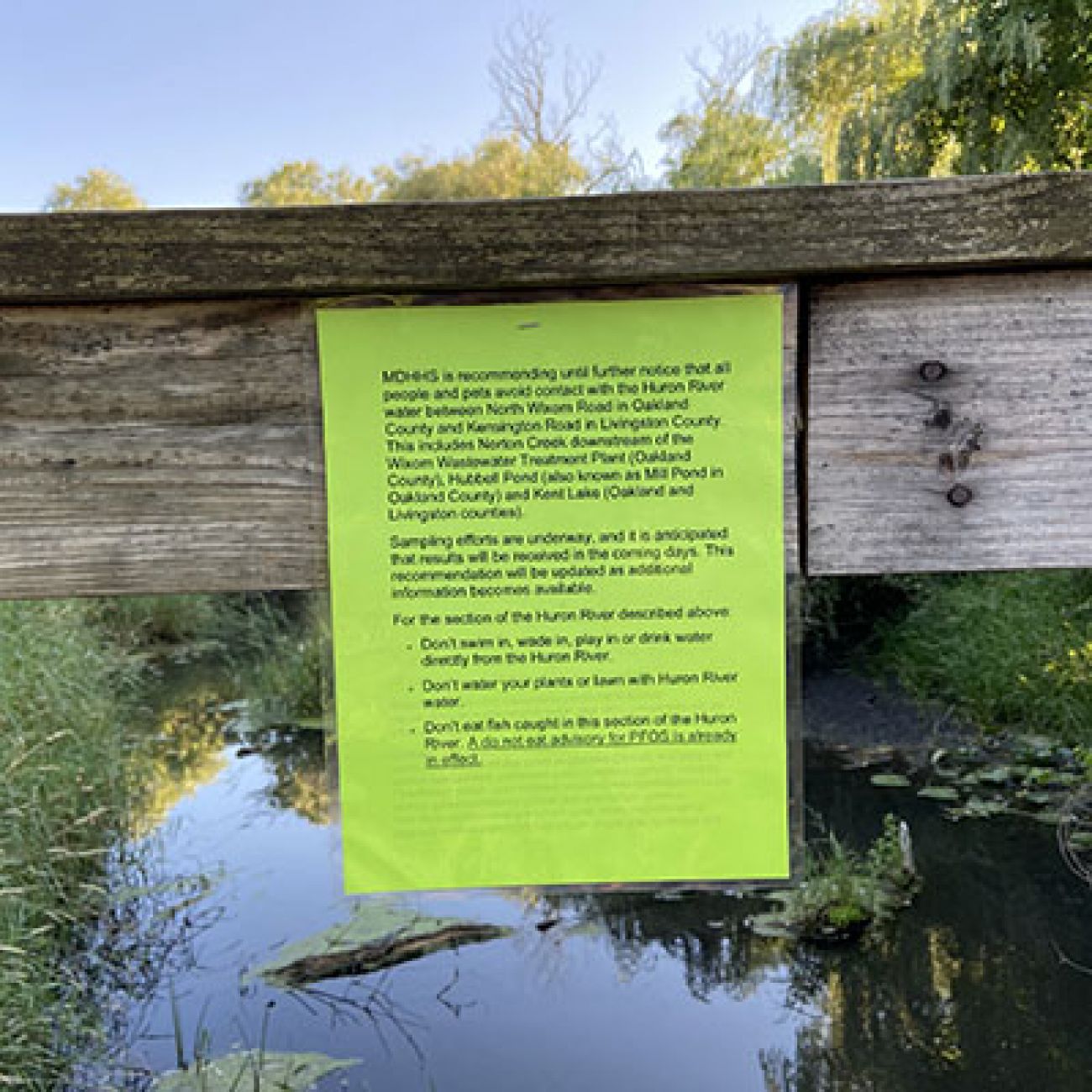Latest Huron River tests find no cancer-causing chromium; advisory remains

- Initial tests find no hexavalent chromium in the Huron River
- ‘Don’t touch’ advisory remains; more tests planned
- The spill is renewing scrutiny of Michigan’s pollution laws
Aug. 10: State: Tribar staffer ignored 460 alarms in Huron River chromium release
Aug. 9: Huron River chromium spill prompts call for stricter Michigan pollution law
Michigan regulators continue to search for a suspected hexavalent chromium plume in the Huron River near Wixom, after the latest round of water samples turned up none of the toxic metal.
Officials with the Michigan Department of Environment, Great Lakes and Energy cautioned that it’s impossible to draw conclusions about the river’s safety from only a handful of samples. A don’t-touch advisory remains in effect for the stretch of the river between North Wixom Road in Oakland County and Kensington Road in Livingston County, while scientists continue to collect samples downstream of the Wixom wastewater treatment plant.
“We’ll have dozens taken today that will be run tonight and available tomorrow,” Hugh McDiarmid, a state environmental agency spokesperson, said on Thursday.
Related:
- Anger, uncertainty and a race for answers in Huron River chromium spill
- Cancer-causing hexavalent chromium spills from Wixom plant into Huron River
“That should give us a better picture.”
The tests follows news on Tuesday of a multi-thousand-gallon release of a hexavalent chromium-containing solution from auto supplier Tribar Manufacturing’s facility on Alpha Drive in Wixom. From there, the solution entered Wixom’s sewers, traveling to the city wastewater treatment where treated sewage discharges into the Huron River tributary of Norton Creek.

Residents are advised not to touch or drink the river water, water plants or eat fish caught from the water in the affected area.
Hexavalent chromium, also known as chromium-6, is a toxic compound linked to lung cancer and other health issues.
So far, the results from 11 samples taken Tuesday and Wednesday have revealed no trace of hexavalent chromium. More than two dozen more sites along the river and within the treatment facility are being sampled Thursday, with results expected on Friday.
That includes Barton Pond, where Ann Arbor draws its drinking water from the Huron River. Though the river’s flow rate makes it unlikely any potential chromium plume would reach that far downstream for several weeks, a state release called the tests “a precaution and to establish baseline data should contamination reach the intake.”
Still unclear is how the release occurred and when. Tribar officials told state regulators about the incident Monday afternoon, more than seven hours after discovering the release, according to state officials. The release could have begun as early as Saturday.
State officials have said the company, which manufactures decorative trim, grilles, door seals and other automotive components, was using the hexavalent chromium to chrome-plate its products.
Tribar released a statement Thursday night saying the company "takes the health and safety of our neighbors and community, as well as the protection of the environment, very seriously."
Wixom City Manager Steven Brown said the initial water test results offer hope that much of the chromium that entered Wixom’s sewers may have settled in the treatment plant or attached to solid waste, rather than flowing downstream along with the city’s treated effluent.
McDiarmid, the state environmental agency spokesperson, said regulators will test that theory, along with the possibility that the metal could have settled to the riverbottom downstream of the plant. Early state testing occurred only in the upper foot of the water column.
It’s not surprising that the 11 samples turned up empty, said Jeff Gearhart, research director at the Ann Arbor-based Ecology Center, a long-time advocacy group monitoring the Wixom developments.
“It’s a long section of river,” he said.
Gearhart emphasized that he doesn’t know the details of the sampling plan, and he has been unable to find a similar spill into a closed river system like the Huron — one against which to compare this week’s local response.
Still, he said, “it seems to be that a more aggressive, thorough sampling plan would be appropriate.”
And, the sooner, the better, Gearhart added: “The longer it goes, the more dispersion is going to happen.”
Brown, the Wixom city manager, is bracing for an expensive cleanup to remove hexavalent chromium contamination from the water treatment plant. He said the city will pursue Tribar for reimbursement.
McDiarmid has said the agency is pursuing “all circumstances surrounding the release,” with nothing yet ruled out.
As the investigation continues, calls are mounting for Michigan lawmakers and regulators to strengthen the state’s industrial pollution laws.
U.S. Rep. Elissa Slotkin, D-Lansing, took to Twitter to condemn Michigan’s lack of “laws with any real teeth to make polluters pay.”
“Bills have been introduced in the state legislature but they haven’t gone anywhere,” Slotkin wrote. “The Huron River used to be one of the cleanest in the nation — we need to be able to hold polluters accountable.”
Rep. Yousef Rabhi, D-Ann Arbor, has repeatedly introduced bills to require industrial polluters to pay for cleanup after they release harmful substances into the environment, but those bills have failed to gain traction. The latest attempts, twin bills sponsored by Rabhi and Sen. Jeff Irwin, another Ann Arbor Democrat, have been sitting in committee for more than a year.
“It hasn’t gotten much traction largely because of the polluting industries,” Rabhi said. “The Michigan Manufacturing Association in particular has been doing everything they can to make sure it doesn’t go anywhere.”
In addition to renewed focus on polluter pay laws, Daniel Brown, a watershed planner with the Huron River Watershed Council, said he expects environmentalists to engage in a new push to limit hexavalent chromium use in Michigan in light of the Tribar spill.
California, where hexavalent chromium contamination stemming from a utility provider was dramaticized in the “Erin Brokovich” movie, this year proposed its own hexavalent chromium drinking water standard of 10 parts per billion, and has proposed phasing out the compound’s use in chrome plating.
Some auto companies have begun to voluntarily limit the compound’s use.
Bridge attempted to contact multiple companies listed on Tribar’s website to ask if they accept hexavalent chromium-containing products. Only two replied.
Stellantis spokesperson Jodi Tinson said the compound is used in chrome plating for some of the company’s vehicle parts.
Tony Sapienza, a spokesperson for Livonia-based automotive supplier ZF Group, told Bridge the company does not use the compound in its products.
Michigan Environment Watch
Michigan Environment Watch examines how public policy, industry, and other factors interact with the state’s trove of natural resources.
- See full coverage
- Subscribe
- Share tips and questions with Bridge environment reporter Kelly House
Michigan Environment Watch is made possible by generous financial support from:
Our generous Environment Watch underwriters encourage Bridge Michigan readers to also support civic journalism by becoming Bridge members. Please consider joining today.
See what new members are saying about why they donated to Bridge Michigan:
- “In order for this information to be accurate and unbiased it must be underwritten by its readers, not by special interests.” - Larry S.
- “Not many other media sources report on the topics Bridge does.” - Susan B.
- “Your journalism is outstanding and rare these days.” - Mark S.
If you want to ensure the future of nonpartisan, nonprofit Michigan journalism, please become a member today. You, too, will be asked why you donated and maybe we'll feature your quote next time!






